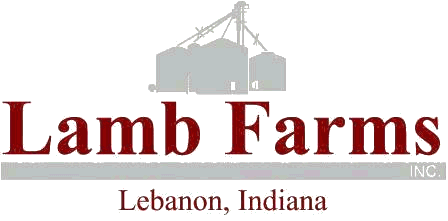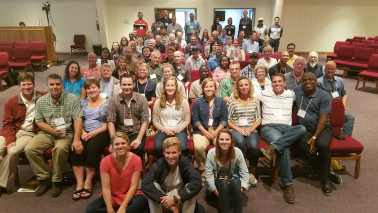A Ripple From Our Farm to Foreign Shores
Agriculture reinforces the effect of one small action growing into something bigger. Seeds are planted, and from that, there is a harvest, and more seeds. We’ve always been keenly aware of the role that our faith plays in our daily life and in our business, and we’ve worked to share that faith with others who work the land.
2017 Farming God’s Way Conference
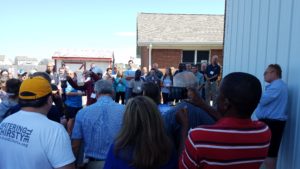 Our AgriStewards program demonstrates the ripple effect in action. We recently hosted our second Farming God’s Way conference here at the farm, with 90 participants from 14 states who are headed to 30 different countries around the world.
Our AgriStewards program demonstrates the ripple effect in action. We recently hosted our second Farming God’s Way conference here at the farm, with 90 participants from 14 states who are headed to 30 different countries around the world.
When Brian Smith came to the farm in 2010, he was only looking for some part time work while he decided how he would best serve in the mission field. At the time, I made an off-hand comment to him, that he didn’t have to leave the farm to do mission work. Within a few weeks, we were discussing how that philosophy would best be shared, and soon after, Brian was headed to Kenya, loaded with resources, one of which was the Farming God’s Way curriculum. Since then, Brian has headed up our AgriStewards division full time.
Incorporating Technology, Ag Practices, and Biblical Principles
This teaching helps subsistent farmers learn better soil management and ultimately better crop production through a program that combines biblical principles, management techniques, and ag technology.
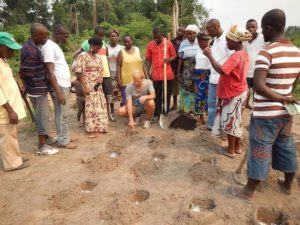 Farming practices in much of the third world countries deplete the soil in just a few short years. Many times farmers would not be able to sustain their farm and would give up, move to an urban area and face even more challenges such as being forced into slave labor or poverty conditions. The Farming God’s Way training shows them how they have everything available to them to sustain the soil, such as food waste that can be used for compost and animal manure that can be worked in. In the fall, they can utilize leaves and other dead plant material as the mulch layer, rather than burning these materials, which was their previous practice.
Farming practices in much of the third world countries deplete the soil in just a few short years. Many times farmers would not be able to sustain their farm and would give up, move to an urban area and face even more challenges such as being forced into slave labor or poverty conditions. The Farming God’s Way training shows them how they have everything available to them to sustain the soil, such as food waste that can be used for compost and animal manure that can be worked in. In the fall, they can utilize leaves and other dead plant material as the mulch layer, rather than burning these materials, which was their previous practice.
As Brian tells it, many can’t believe it when he tells them we’ve been using the same piece of land for over 100 years and even improved the quality of the soil with our sustainable practices.
Overcoming Skepticism
It’s not uncommon for the farmers in these areas to be highly skeptical at first, but like the ripple effect, one or two farmers will implement their new knowledge in a plot or two. As neighbors notice the improvement in his crops (often as much as triple the yield), they are willing to adopt the practices as well. It continues, as neighboring areas see the result and are ready to learn how to use these techniques.
From Cambodia to the Caribbean, South Africa and beyond, we’ve found that these basic ag stewardship practices can be adapted to that location and their specific crop needs. Most are small farmers working one or two acres of land raising food to feed their families. By learning better techniques, they can often grow enough to earn income as well. For instance, Brian helped local farmers in Cambodia improve their crop of Morning Glory vines, a staple in their diet, but a plant we Midwest farmers view as a problem weed.
Where AgriStewards is Growing
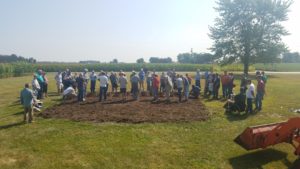 It’s exciting to see how this effort will continue to grow. Just a small comment over seven years ago was all God needed to get us started. It wasn’t something we initially set out to do, but all of us here at Lamb Farms see the value and are open to spreading more than good farming practices to others. Those 90 participants at our recent conference will spread it further.
It’s exciting to see how this effort will continue to grow. Just a small comment over seven years ago was all God needed to get us started. It wasn’t something we initially set out to do, but all of us here at Lamb Farms see the value and are open to spreading more than good farming practices to others. Those 90 participants at our recent conference will spread it further.
Brian visited seven countries over the past year. Now we have been presented with the opportunity to bring this same program to inner cities here in the U.S., helping urban areas create community gardens.
If you or your organization want to learn more about Farming God’s Way and the mission work it can impact, contact us at AgriStewards.
